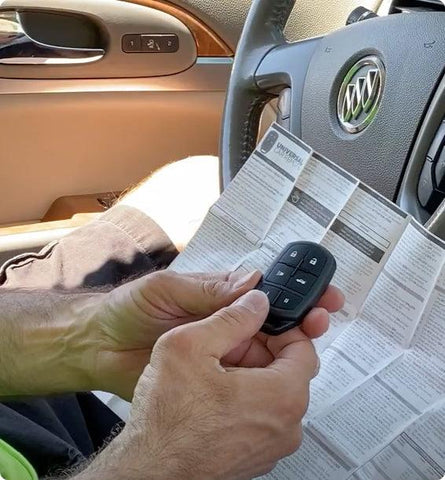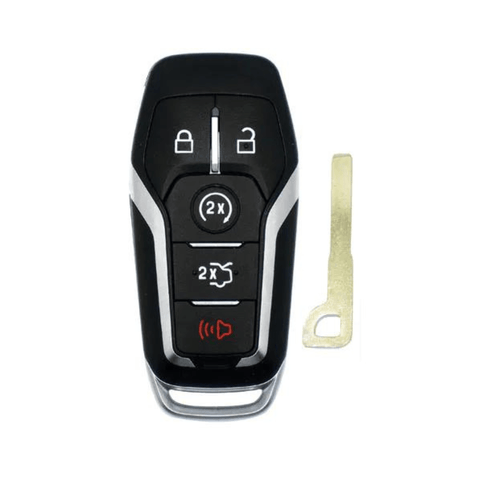Introduction
In the realm of car ownership, the significance of car keys transcends beyond their physical size. These small yet crucial instruments not only ignite engines but also embody security, convenience, and sometimes, a fair share of challenges. This comprehensive guide embarks on a journey through the nuances of spare car keys and the intricacies of DIY car key programming, offering insights, solutions, and empowering knowledge for every car owner.
The Essential Role of Spare Car Keys
The tale of lost car keys is a familiar one to many, often unfolding in the most inconvenient of times. Whether it's a frantic morning when you're already late for work, or at the end of a long day when all you yearn for is the comfort of your home, the absence of your car keys can turn ordinary situations into crises. It's in these moments that the value of a spare car key becomes glaringly apparent.
Why Spare Keys Matter: A spare key is more than just a duplicate of your original key; it's a safeguard against a multitude of potential disruptions. It's the hero in times of accidental lock-ins or lockouts, the savior when the primary key goes missing, and a peace-bringer when you're unsure if you lost your key or merely misplaced it temporarily.
Acquiring Your Spare Key: Securing a spare key can be a straightforward process, but it requires a decision tailored to your vehicle's type and your personal needs. For traditional car keys, duplication is a simple task that can be completed at most locksmiths or hardware stores. However, as technology has advanced, so have car keys, leading to the development of transponder keys and key fobs, which might require programming alongside cutting.
- Dealership Services: They offer a guaranteed solution, particularly for complex keys that require programming. The dealership ensures that the new key is perfectly compatible with your vehicle's system.
- Local Locksmiths: A more budget-friendly option for key duplication and programming. It's crucial to ensure that the locksmith is equipped and experienced with your car's specific key type.
- DIY Key Duplication: For the more traditional keys or car owners who are comfortable with a bit of hands-on work, DIY key duplication can be both a cost-effective and rewarding endeavor.
You can search for your year, make, and model and have a DIY spare key. https://tomskey.com/

Storing Your Spare Key Wisely: Once you have your spare key, the next challenge is deciding where to keep it. The ideal location is secure yet accessible in emergencies. Here are some suggestions:
- At Home in a Concealed Spot: This could be in a safe, a hidden compartment, or another secure location that only you and trusted family members know.
- With Someone Trusted: Leaving a spare key with a reliable neighbor or a family member can be a practical solution, especially if they live nearby.
- Innovative Hiding Places: There are various products designed to conceal spare keys on your vehicle or in outdoor settings. However, these should be used with caution due to potential security risks.
DIY Car Key Programming: Demystifying the Process
The advancement of car key technology has introduced the concept of key programming, which, in many cases, can be a DIY task. Whether it's a transponder key or a key fob, understanding the basics of car key programming can save you time and money.
Understanding Key Types and Programming Needs:
- Traditional Keys: These keys don't require programming, making duplication a straightforward task.
- Transponder Keys: These contain a chip that needs to be programmed to match your car’s ignition system. The programming often involves a sequence of ignition turns and key presses.
- Key Fobs and Smart Keys: Programming these high-tech keys can be complex, involving specific steps that vary significantly based on the make and model of your vehicle.
The Programming Adventure: Embarking on DIY key programming requires some research. Vehicle manuals often provide the necessary steps, and numerous online resources and forums are dedicated to specific car models and key types. The process generally involves manipulating the car's ignition in conjunction with the key or fob to enter a programming mode, followed by a series of actions to synchronize the key with the car's computer.
Tools You Might Need: Depending on your car model, you might need specialized tools to program your key. This could include an OBD2 (On-Board Diagnostics) scanner, which connects to your car to facilitate the programming process.
When to Opt for Professional Help: While the DIY approach can be appealing, it’s essential to recognize its limits. If the programming process is too complex or if you're not comfortable handling the required tools and steps, seeking professional assistance is the prudent choice.
Understanding Different Types of Car Keys
The evolution of car keys is a reflection of the advancements in automotive technology and security. From the simple metal key to the modern smart key, each type serves the same basic function but in increasingly sophisticated ways.
Traditional Keys: Once the standard, these are straightforward mechanical keys without electronic components. While easy to duplicate, they offer minimal security against theft.

Transponder Keys: Introduced to improve vehicle security, these keys contain a microchip that communicates with the car's immobilizer. The car won't start unless it recognizes the specific chip code, significantly reducing the risk of theft.

Key Fobs and Smart Keys: The epitome of convenience, these keys allow for keyless entry and push-button start. They communicate with the car using encrypted wireless signals, providing enhanced security and ease of use. However, their complexity means they are the most challenging to duplicate and program.

Navigating Car Key Replacement and Repairs
Losing a car key or dealing with a malfunction can be an exasperating experience. Understanding your options for replacement and repair is crucial in navigating these situations.
DIY Key Replacement: For simpler key types or those comfortable with the process, replacing your key yourself can be a viable option. This requires some technical knowledge, especially if programming is involved.
Professional Services: Opting for a locksmith or dealership is recommended for more complex keys or if you're unsure about the DIY process. They have the necessary expertise and equipment to handle a wide range of key types.
Cost Considerations: While professional services offer convenience and reliability, they can also be more expensive. Weigh the cost against the complexity of the task and your comfort level with DIY solutions.

Advanced Car Key Technologies and Innovations
Car key technology continues to evolve, pushing the boundaries of convenience and security. Smart keys and mobile app integrations are becoming more prevalent, offering features like remote locking/unlocking, car locating, and even starting the engine remotely. These advancements simplify the user experience but also introduce new challenges in programming and duplication due to their complex security features.
Maintenance and Care for Car Keys
Proper maintenance of your car keys is vital for ensuring their longevity and reliability. Regular checks, proper storage, and handling can prevent common issues like wear and tear or battery failure in key fobs. For electronic keys, it's important to avoid exposure to water and extreme temperatures, and to replace batteries promptly.

Conclusion: Empowering Yourself with Key Knowledge
Understanding the intricacies of car keys, from their types and programming to maintenance and replacement, empowers you as a car owner. It enables you to make informed decisions, whether it’s creating a spare key, programming a new one, or handling a lost key situation. In today’s fast-paced and often unpredictable world, being equipped with this knowledge is not just a convenience—it’s a necessity for the savvy car owner.



